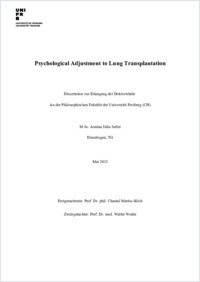Psychological adjustment to lung transplantation
- Seiler, Annina Julia
- Martin Soelch, Chantal (Degree supervisor)
-
2015
1 ressource en ligne (145 p.)
Thèse de doctorat: Université de Fribourg, 2015
English
Lung transplantation (LTx) is an effective treatment for end-stage lung failure. Despite great advances in transplant medicine over the last few decades, LTx does not result in complete recovery of health, as transplant recipients continue to be confronted by various health problems that must be psychologically processed and overcome. Many suffer from frequent emotional distress and psychological disorders that can negatively influence their ability to cope with their new organ, negatively impacting both their adherence to immunosuppressive therapy and health-related quality of life (HRQoL). Therefore, it is both clinically and scientifically relevant to assess the postoperative HRQoL and mental health of LTx recipients to identify those at risk for poor post-transplant outcomes and to improve patients’ symptom experience. This manuscript consists of three studies that review psychological adjustment to lung transplantation in terms of HRQoL and psychosocial outcomes via three different approaches. Study 1 is a systematic review of the literature to compile and interpret the evidence on measures to assess HRQoL and psychological outcomes following LTx, summarizing psychological outcomes in studies published between 1994 and 2013. Of 371 articles, 63 studies were selected for final review. Considerable heterogeneity was found in methodology, operational concepts and applied outcome measures in the existing literature on HRQoL and psychological outcomes after LTx. Nevertheless, eligible studies generally point to significant improvements in both mental health and HRQoL post-transplant. A huge opportunity for future research lies in the development of guidelines to aid in the selection of outcome measures to assess psychological outcomes of lung transplant recipients. The second study investigated the psychosocial outcome trajectories of 40 lung transplant recipients related to psychological distress and HRQoL over their first six months posttransplant. Three distinctive clusters were identified: (1) patients with optimal postoperative trajectories (35%); (2) patients with good postoperative trajectories (42%); and (3) patients with poor postoperative trajectories (23%). The last group tended to be older, to suffer from more severe disease, to have more co-morbid conditions, and to have had a prolonged ICU and/or hospital stay. Disease severity, length of stay, and HRQoL two weeks post-transplant were strong predictors of psychological distress and impaired HRQoL at six months of follow-up. The results underscore the psychosocial needs of patients with poor post-transplant trajectories. The third study qualitatively analyzed patient experiences with transplantation and their adjustment to normal life within the first six months post-transplant. ‘Physical benefits’, ‘fear of rejection’, ‘gratitude towards the donor’, and ‘side effects’ were the most frequently named themes with respect to the transplantation process, new lungs, donor and medication regimen. Most themes remained unchanged over time. While comments about ‘intensive care unit delirium’ and ‘worries regarding donated organ quality’ diminished significantly over time, mentions of ‘restrictions in everyday life’ increased significantly. Gender comparison revealed only marginal differences in the response categories. Improvements in physical function during the early postoperative phase may be limited by the onset of clinical complications, fear of rejection and infections, medication side effects, and restrictions in everyday life. Generally, studies on HRQoL and psychological outcomes after lung transplantation have been limited by lost to follow-up, cross-sectional designs, small sample sizes and, great variability in the use of validated and non-validated outcome measures, such that comparisons between different studies are difficult. One area of future research is the development of consensus guidelines to aid in the selection of outcome measures to assess HRQoL and psychological outcomes among LTx patients. In addition, longitudinal studies, including pre- vs. post-transplant assessment with adequately-sized samples are needed to further investigate outcome profiles and identify additional outcome predictors in these patients.
- Faculty
- Faculté des lettres et des sciences humaines
- Language
-
- English
- Classification
- Psychology
- Notes
-
- Ressource en ligne consultée le 22.10.2015
- License
-
License undefined
- Identifiers
-
- RERO DOC 257543
- URN urn:nbn:ch:rero-002-114729
- RERO R008285464
- Persistent URL
- https://folia.unifr.ch/unifr/documents/304801
Statistics
Document views: 395
File downloads:
- Texte intégral: 275
